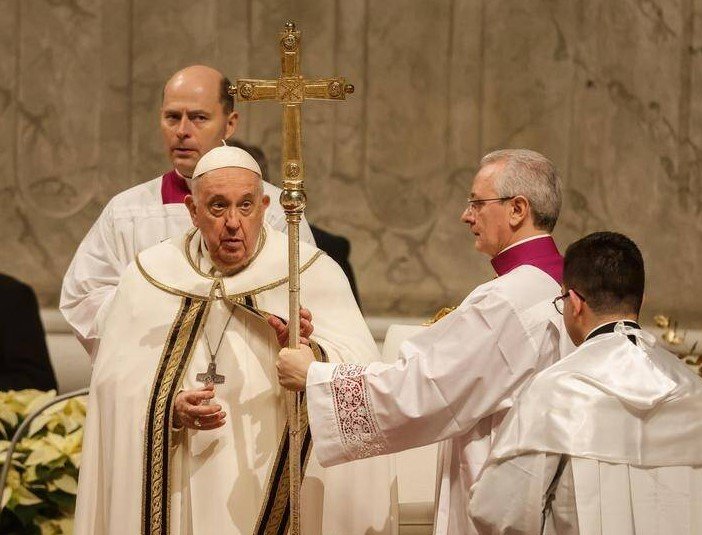As the world grapples with the ongoing tragedy in Gaza, the death of Pope Francis has struck a deep chord with many, especially Palestinians, who remember him as a powerful voice for peace and empathy. His passing on April 21, 2025, has led to reflections on his tireless advocacy for Palestinian rights, particularly during his visits to Jerusalem and his vocal condemnation of the humanitarian crisis in Gaza.
In the Christian quarter of Jerusalem, close to the revered Church of the Holy Sepulchre, many mourn the loss of a pope who, for much of his papacy, took a firm stance on the plight of Palestinians. Ghassan Makhalfeh, a 60-year-old Christian from Jerusalem, described Pope Francis’s death as not just a loss for the Church, but a loss for the Palestinian cause. “His empathy was given to everyone, to all who suffer. For the hostages in Gaza, for the children dying in Gaza under the bombs,” Makhalfeh said. The pope, he noted, spoke out not in favor of one side, but for peace, justice, and a ceasefire.
Pope Francis: A Pope for the Palestinians
Pope Francis’s connection to Gaza and the Palestinian people was deeply personal. From early in his papacy, he expressed his commitment to the Palestinian cause, officially recognizing the State of Palestine in 2015. His advocacy for Palestinian rights was not only symbolic but a consistent feature of his tenure, especially in the context of the Gaza conflict. His position was clear: the suffering of innocent civilians, particularly the children of Gaza, weighed heavily on him.
In his messages, especially during the Easter celebrations in 2025, Pope Francis repeatedly condemned the “dramatic and disgraceful humanitarian situation” in Gaza. His words resonated beyond religious lines, as they reflected a genuine concern for the innocent lives affected by the ongoing violence. The pope was outspoken about the atrocities happening in Gaza, never shying away from calling them what they were: “cruelty, not war.”

Gaza and the Pope’s Powerful Symbols
One of the most striking symbols of Pope Francis’s solidarity with Palestinians occurred in December 2024, after an Israeli bombing killed seven children from the same family in Gaza. The pope’s response was emotional and passionate. “Yesterday, children were bombed,” he said, visibly shaken. “This is cruelty, not war. I want to say it because it touches my heart.” This declaration, made during his Christmas address, was a testament to his unwavering commitment to speak out against violence, regardless of the political context.
During his visit to Bethlehem, Pope Francis also participated in an act of symbolic solidarity. He prayed in front of a Nativity scene, where the baby Jesus lay on a black-and-white keffiyeh—a traditional Palestinian scarf that has become a symbol of resistance. This image was poignant, underscoring his stance not just as a religious leader but as a compassionate advocate for those suffering under occupation.
The relationship between Pope Francis and Palestine was one of deep moral conviction. The Palestinian Authority, led by President Mahmoud Abbas, honored the pope’s memory after his passing. Abbas paid tribute, stating that the Palestinian people had lost a “faithful friend” in the pope. His support for the Palestinian cause was clear and unwavering, and his death has left a void that many fear will be hard to fill.
A Call for Peace and Ceasefire
In the wake of Pope Francis’s death, many around the world, particularly in the Palestinian territories, are now calling for a continuation of his work for peace. The pope was a voice in the international community that consistently called for a ceasefire in Gaza, urging both Israeli and Palestinian leaders to engage in dialogue rather than escalate violence. His calls for peace were not only directed at those directly involved in the conflict but also at the international community, urging them to push for a resolution.
The pope’s final messages, read aloud by one of his collaborators on Easter Sunday, were filled with both sorrow and urgency. He denounced the ongoing violence and warned against the “growing climate of anti-Semitism” as the conflict continued to worsen. His condemnation of both the humanitarian crisis in Gaza and the rising hatred on both sides highlighted his belief in the need for compassion and reconciliation.
The Legacy of Pope Francis in Jerusalem
Pope Francis’s relationship with Jerusalem and its people was complex, shaped by the city’s religious significance and the ongoing conflict in the region. However, his stance was clear: he stood with the oppressed, regardless of their faith or nationality. His support for the Palestinian people, especially during times of hardship, was a defining aspect of his papacy.
His death has left many in Jerusalem, and around the world, reflecting on the loss of a leader who was not afraid to speak out for those who had no voice. For Palestinians, Pope Francis’s death marks the end of an era of papal support for their cause, and they fear the absence of such a strong voice in the fight for justice.
As the world mourns the loss of Pope Francis, his legacy of peace, empathy, and solidarity with the oppressed, especially the Palestinians, will be remembered. His calls for peace, his symbolic acts of solidarity, and his unwavering stance on the humanitarian situation in Gaza remain a powerful part of his papacy.
